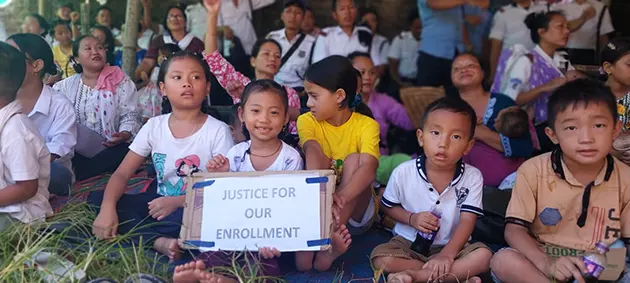[ Bengia Ajum ]
ITANAGAR, 29 Sep: The family members of the agitating Itanagar Traffic Wardens (ITWs) have joined the indefinite peaceful sit-in protest at the tennis court near IG Park. The wardens have been protesting since 15 September, demanding immediate absorption of all 145 wardens into the Arunachal Pradesh Home Guard cadre, following the recent creation of 200 posts by the state government. Their wives and children have now joined them in solidarity.
Many of the children are missing classes to join their fathers in the protest. With the government yet to act on their demand, the traffic wardens have expressed deep disappointment over the non-responsive attitude of the state authorities.
“Fifteen days have passed, but the authorities have not bothered to respond to our demand. We are being completely ignored, and the government is treating us as if we are not an important part of society. We are deeply hurt by this attitude,” said one of the protesting traffic wardens.
With the wardens off duty, traffic management in the Itanagar Capital Region (ICR) has become a major issue ahead of the Durga Puja festivities. “We feel bad not being out on the field, especially as the traffic situation worsens due to the Durga Puja celebrations. But the people of ICR should understand that we are helpless and have no choice but to take this extreme step,” the warden added.
The wardens had met Home Minister Mama Natung two months ago and submitted a memorandum demanding immediate absorption of all 145 wardens into the Arunachal Pradesh Home Guard cadre.
“When we met the home minister, he called senior police officials in front of us and urged them to look into our demand. But since then, we have not heard anything from the home minister’s office,” the warden informed.
The traffic wardens have made it clear that they will not suspend the sit-in protest until their demand is fulfilled.
The recruitment of ITWs began in 2011. They were hired temporarily to manage traffic in the ICR, as the state’s traffic cell lacked the necessary human resource to cope with the region’s growing needs. The first batch was recruited in 2011 and the last in 2016. Of the total 145 wardens, eight are females and the rest are males.




